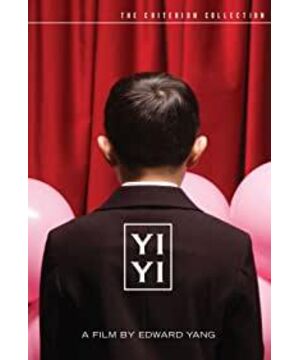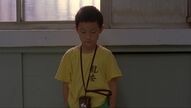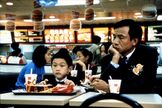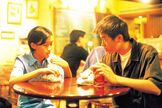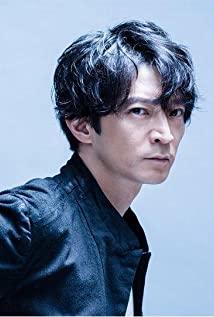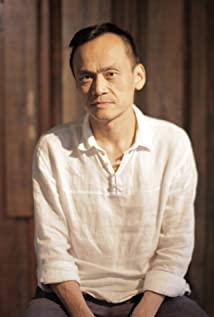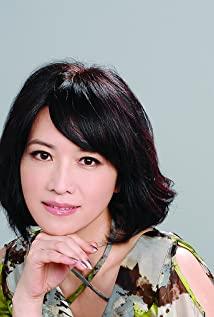As the last feature film directed by Yang Dechang, the film "Yi Yi" is not only a concentrated display of Yang Dechang's screenwriting genius and directing style - the characteristics of multi-line narrative, fixed camera, Taipei city and other previous works are completely in "Yi Yi" Tiancheng - At the same time, as a summary of the director's career creation in a sense, it is also Yang Dechang's summary and perception of his life past.
According to Yang Dechang's interview, the inspiration for the story came from a friend whose father fell into a long-term deep coma, and his family had to keep talking to him every day to hope for a cure. In "One One", Yang Dechang skillfully sets the sick person as his mother-in-law. By asking the mother-in-law's family to speak directly to her, to the camera, and to the audience, expressing their thoughts and worries, the director seems to be telling us that the seemingly peaceful middle-class life is actually turbulent, and everyone There are depressions that he can't get rid of. On the other hand, we can also get a glimpse of each character's character and state, such as Adi's worldliness and love for face, Minmin's tiredness of poor and repetitive life, and Tingting's kindness and vulnerability. From a narrative point of view, such a setting greatly improves the efficiency of the narrative, and it appears repeatedly as a metronome of narrative rhythm until the end.
The whole film has many characters and clues, but it is well arranged, showing the director's superb narrative skills and storytelling ability. The film shows us the daily work and life of the male protagonist NJ's family. Through a series of experiences of NJ, son Yangyang, daughter Tingting and other figures in family, workplace and school, it provides us with a close observation of Taiwan's society and middle class. Window of a class home. The story starts at a wedding and ends at a funeral. At the same time, there is a baby's full moon drink in half of the film. During the filming, we experience the life, old age, illness, and death of the characters in the play, and reflect the reality. Why don't we interpret the joy, anger, sorrow and joy of each of them?
NJ, played by Yang Dechang's close friend and one of the main actors of "Taiwan New Film", NJ, is one of the few charming characters created by Yang Dechang's films. , Most of the colleagues around him are hypocritical and snobbish, and the only one who resonates with him is Ota, the boss of Japan's Ota Company. NJ is unhappy at work, her mother-in-law is ill, and her wife goes up to the mountain to cultivate Buddhism to get rid of the predicament, and she encounters her first love, Ari, at her brother-in-law's wedding.
It's like a typical "middle-aged anxiety" story, but Yang Dechang handles it lightly. He skillfully avoids sensationalism, curiosity and other unrestrained elements, and presents NJ's state in a de-dramatic way. A typical passage is when NJ and Ari were walking in a cemetery in Japan, and the two chatted about the past and went into the depths of the field under the fixed camera. At this time, the alienation of the camera and the intimacy of the dialogue between the two formed an interesting contrast - - A kind of Hou Hsiao-hsien-style emotional situation.
Although NJ had the opportunity to live a new life as a young man, he still refused to start over with Ari, even though he "never loved another person" except for Ari, he was also frank with his wife, "It seems that if I live again There's really no need for that." These seemingly plain words also reveal the cruel truth of life, that is, regret is also an important part of life. There is no restart button in life. We have and can only live once. Or as Tian Zhuangzhuang said in "Later Us", "It's good to live up to the other party, it's hard to live up to this life".
Another charming character portrayed in the film is NJ's son Yangyang. At the age of eight, he is innocent and lively and is often bullied by girls, but at the same time he has maturity and wisdom beyond his age, and sometimes asks questions that even NJ never thought of. Correspondingly is NJ's daughter Tingting. She has excellent grades and is the "good girl" in the family. She fell into deep self-blame because she forgot to throw garbage and caused her mother-in-law to fall into a coma. At the same time, she was in love with her neighbor Lily and her boyfriend Fatty. Trapped in some kind of complicated triangle.
In a sense, the two groups of characters, Yangyang and Tingting, correspond to variations of rationality and sensibility, and this is also the consistent theme and feature of Yang Dechang's films. In the movie, Yangyang is an actionist. After being bullied by girls, he will "revenge" by puncturing balloons and throwing balloons filled with water; he is curious about his surroundings, and hopes to understand the unseen truth through actions. , In order to let others see the other half they can't see, he used a camera to photograph the back of their heads; Yang Yang, who was sexually enlightened in biology class and had a good impression of the "little wife", learned to swim by holding his breath at home. Yangyang's sensible, ingenious, curious about the world, and his initiative to take action give him a certain degree of control over the surrounding environment. At the same time, he is one of the few characters in the film who can give us hope and courage every time he appears. . When he said to his mother-in-law "I think, I'm getting old too" at the end, we would all smile knowingly. On the one hand, it is difficult for us to imagine that a child like Yangyang can speak such mature adult words, on the other hand We are not surprised either, because he is Yang Yang, or in a sense, he is director Yang Dechang himself.
Correspondingly, Tingting always seems to be trapped in the surrounding environment and blames it on herself, whether it is her mother-in-law's fall or her emotional entanglement with Fatty. She is pure and kind, and believes that "we treat others well, and others will not treat us badly", but she is always in a passive position, and her relationship with Fatty is largely just an emotional substitute for him when he lost Lily. . Just like the last dream she had when her mother-in-law woke up, to a certain extent Tingting has been stuck in the fantasy she has built for herself, or she has never set foot in the adult world, so she will question "why is this world different from what we think?" Different". And Fatty is the bridge that connects the adult world and the non-adult world, and it is also all the external force that shatters her last fantasy of this world. Towards the end of the film, the plant she neglected to take care of has finally bloomed, and Tingting, who experienced emotional frustration, juvenile murder, and the death of her mother-in-law, also grew up.
Parent-child relationship is an eternal theme that cannot be avoided in Chinese families. In "Yi Yi", the director showed us the touching family relationship between father and son and between father and daughter in a genius way. The father-son relationship has always been a major theme of Yang Dechang's films, and the relationship between NJ and Yang Yang's friends in the story is also the warmest in all his films. We probably can’t forget that scene. In the last scene, Yangyang was still pouting unhappily at the dinner table at the wedding, and in the next scene, Yangyang was happily eating McDonald’s, father and son facing each other, Yangyang grinning. With a smile, the father and son's affection is self-evident. At the same time, the father-son relationship in Yang Dechang's films cannot avoid Confucian inheritance and education. In the film, the camera is what NJ hopes to pass on to Yangyang, and the camera is not just an object here, it also signifies the attitude and way of looking at the world. Of course, in the film, the son seems to see higher and farther than his father, and he uses a camera to take pictures of things that others can't see.
Different from the direct expression of the father-son relationship through the same frame and dialogue, except for a few scenes such as NJ holding the crying daughter's hand at the end of the film, the director in the middle of the film uses parallel editing to "different frames form the same frame". Show the relationship between father and daughter in different spaces at the same time. When father NJ and his old lover were reliving their youth, daughter Tingting also went shopping with her boyfriend for the first time and fell in love, crossed the sidewalk, held hands and finally ran away after the house was opened. The things that have happened, the daughter is still doing today, the mistakes that the father made, the daughter makes the same. Of course, this may be a common experience in adolescence, but more importantly, a certain similarity and inheritance between father and daughter is repeated again and again with a kind of fateful reincarnation effect.
As Yang Dechang's last feature film, "Yi Yi" still has Yang Dechang's style of insight and involvement in society, but it is rarely as critical as before.
On the one hand, the film still has an encyclopedic rich capacity, like a prism that refracts the spectrum of Taiwanese society, through which we can make a sliced cross-sectional observation of Taiwanese society. The first is the inhibition and alienation of the individual by urban life. In the film, windows appear in the foreground as a visual element many times, and the reflection of the glass causes blurring or even variation of the portraits. Whether it is Minmin and NJ in the office building, Adi in the hospital, or Ari in the hotel room, everyone's life seems to be affected by it. The surrounding environment is shrouded and controlled, making it impossible to distinguish the real from the unreal. The director repeatedly reminds us with the camera that while the city facilitates our lives by means of busy traffic and partitioned office buildings, it is also blocking our expression and communication. become more and more atomic.
In addition, with the "landscape" of society, traditional ethics and values have been subverted and even swallowed. In the movie, on the one hand, there are various multimedia products such as pervasive monitors, ultrasound images, video games, and TV news brought about by technological progress. They create one landscape after another, and the fetus is reduced to a commodity like a computer game in a sense. On the other hand, there are pirated software, commercial breach of contract, incest between teachers and students, juvenile delinquency, and the commercialization of Buddhism. The values of "benevolence, righteousness, courtesy, wisdom and trustworthiness" that have built Chinese society began to fall apart because of inappropriate times. Under the fetishism of money, "what else is there in this world? it is true?"
On the other hand, although Yang Dechang is still full of worries and dissatisfaction with the social status quo in Taiwan, and has made relevant insinuations in the film many times, what is obviously different from his previous films is that the social criticism of "Yiyi", even if there is, is introverted , neutral. Yang Dechang has no intention of complaining about the oppressive influence of the big era on the little people through images like "Guling Street Teenage Murder Case". The episode of the fat man killing in "Yiyi" is reminiscent of the little four in "Guling Street", but it is obviously different. What’s more, the violent scenes are hidden and replaced by “King of Fighters”-style simulation animations in TV news. Similarly, in "Guling Street", Xiaoming said to Xiao Si unequivocally, "This world will not change", and in "Yiyi", Tingting said, "Why does this world differ from what we think? Different". From declarative sentences to interrogative sentences, Yang Dechang is no longer sharp, but more gentle. He throws questions to the audience, but also leaves the answers and value judgments to the audience.
This probably has a lot to do with Yang Dechang's state of mind. When he filmed "Yi Yi", he had already passed the age of knowing his destiny, and his son Sean will be born soon. He is more returning to the family. Compared with discussing social issues, he More willing to settle down and focus on family and individuals. Therefore, "Yi Yi" is also like a memoir and a semi-autobiographical novel written by him to his past.
In "One One", Yang Dechang projected himself onto the father and son NJ and Yangyang. Just like NJ was urged by his family to take the electrical engineering department, Yang Dechang himself also applied for the electrical engineering department of National Chiao Tung University under the pressure of his father when he was a student. At the same time, what NJ said to Daejeon about music in the car was like a summary of his own life. Yang Dechang loves music all his life, especially classical music (almost every movie of his has classical music), he and Cai Qin became attached because of "Childhood Love", the two had a ten-year marriage, and his second wife Peng Kaili She is also a musician, and she completed most of the piano scores in Yiyi. In the film, NJ not only witnesses the changes in family and social life as an observer and a bystander, but also a participant and witness, although many times it is a last resort. In the end, what NJ said to Minmin was more like talking to himself, and his attitude towards life was to some extent similar to Yang Dechang's attitude at this time. After the ups and downs, the "wisdom" of life that Yang Dechang wants to convey may be summed up appropriately in Romain Rolland's famous words, "There is only one kind of heroism in the world, that is, after seeing the truth of life and still loving life . "
If NJ represents forbearance, calmness and relief, then Yangyang represents another attitude towards life, that is, active action, pursuit of the truth of the world, and always maintaining a child-like curious and sensitive heart. This is not to say that they are two completely different philosophies of life. In fact, both are based on the love of life and active participation in the world. The difference may only be that the former is the tolerance and acceptance of the known world after experiencing the ups and downs of life. The latter is an optimism and exploration of unknown areas before fully realizing the world. This is more like the principles and ways of doing things at different ages in life, and they live in the "old boy" Yang Dechang at the same time.
More importantly, isn't the camera in Yangyang's hands a camera that Yang Dechang uses to observe the world, record life, and dissect society? Yang Yang likes to photograph the backs of other people's heads and tell them what they can't see; similarly, through movies, through "Yi Yi", Yang Dechang has photographed the other half of our lives that we can't see, those that exist in daily life but are often ignored by us the truth of life. In the film, Yang Dechang truly shows us the various aspects of life, some bright, some dark and damp: the decent work that the secular thinks is just a day-to-day repetition in Minmin's eyes; NJ's honest duty In the eyes of colleagues, it is a tool that can be used, disguised, and profit-making; the Jiang family, who is rich in material, has an empty family ethics and is gradually collapsing; the youth who should be blooming in youth, but early and murderers are painted equal sign.
When we cross-examine our own life, we might as well ask ourselves, how much life is selectively ignored by us, and how much is the truth in our eyes? Between the real and the fake, which life should we choose? This goes back to the title of the film "One One". "One" is the smallest individual, and it is also the basic unit that nurtures the world in Taoism's "Tao gives birth to one, one life to two, two to three, and three to all things". In an interview, Yang Dechang said that he "adheres to the importance of every individual in life" and hopes to use "One One" to explore personal issues. Personal problems are the smallest problems, but also the biggest problems. To a large extent, what each of us is also determines what this society and the world look like, and what kind of person we decide to become also determines what the world will look like. At the end of the movie, Yang Yang said, "I think, I'm getting old too", and asked ourselves, before you got old, did you try to recognize the life of the other half that you can't see, and what kind of life do you want to live? Life?
View more about Yi Yi: A One and a Two... reviews


